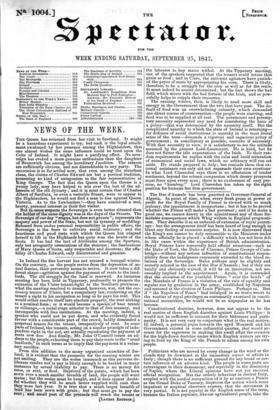The Duc d'Aumale has been gazetted as Governor-General of Algeria.
In point of time, when every fresh grasp at power or profit for the Royal Family of France is viewed with so much jealousy, the appointment is inopportune ; but it has to be proved whether the Prince will make a bad governor ; and if he make a good one, we cannot descry in the appointment any of those for- midable consequences which Whig writers in England prognosti- cate. They describe it as an unheard-of extension of royal patron- age : but the arrangement itself has been beard of long enough to blunt any feeling of excessive surprise. It is now discovered that the King's son cannot be duly responsible to the Ministers under whom officially he is placed : a difficulty which has not been felt in like cases within the experience of British administration. Royal Princes have repeatedly held official situations—such as the Duke of York, the Duke of Clarence, Prince George of Cam- bridge—without any serious infraction of constitutional respon- sibility from the indulgence commonly extended to the blood re- lations of the Sovereign. Rules perhaps may be slightly and secretly relaxed in the case of the Duc d'Aumale ; but if they are totally and obviously waived, it will be an innovation, not ne- cessarily implied in the appointment. Again, it is contended that the elevation of the youthful Prince " over the heads" of the Marshals of France is a violation of the rule of equality and regular rise by gradation in the army, established by Napoleon and restored at the election of Louis Philippe. Perhaps so. But if " the Napoleon of Peace" had indulged in no worse resort to the routine of royal privileges as customarily exercised in consti- tutional monarchies, he would not be so unpopular as he has become.
Constitutional doctrine, however, does not appear to be the real motive of these English diatribes against Louis Philippe : it would not be sufficient to account for their bitterness and perti- nacity. It is not very easy to conjecture what is the real motive. If, indeed, a personal pique towards the aged Monarch and his Government existed in some influential quarter, that would ac- count for the eagerness in making this small affair the occasion for the high-flown doctrine under which English writers are try- ing to hold up the King of the French to odium among his own people.


























